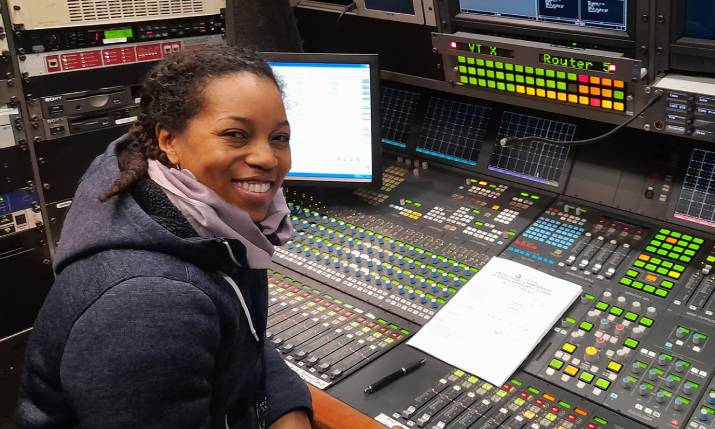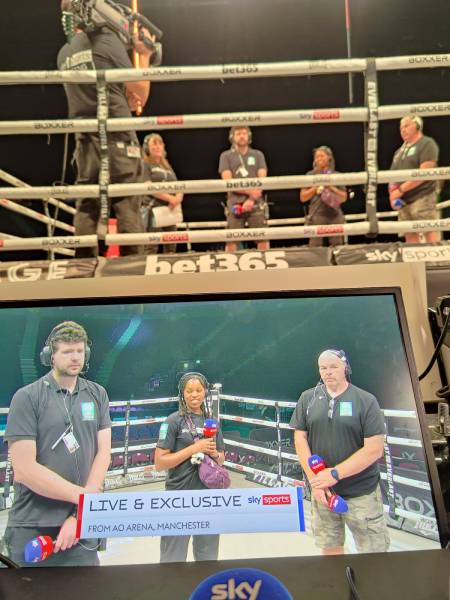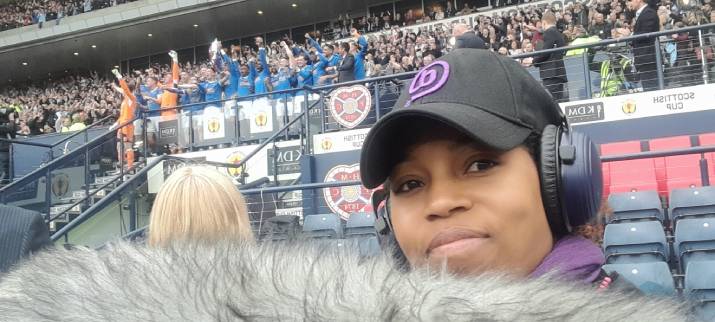Stepping Stones: Freelance sound assistant Hazel DeAyr talks following the music and sounding out opportunities in audio

Freelance sound assistant Hazel DeAyr hard at work
Hazel DeAyr, freelance sound assistant, is based in Glasgow, Scotland. She has navigated her way from music production to hitting the road as an audio assistant on OBs, and has great ambitions for her future career in sound. Her story is part of our Stepping Stones series which aims to bring women at the beginning of their careers in sports broadcasting into the spotlight.
What is your job role today and what do you love about it?
My main job role is sound assistant working mainly in outside broadcast and studio environments. I love the variety and amount of people I get to meet and work with. I enjoy working outdoors (I love it more when the weather is nicer), and I like the comradery you get from working in studio settings.
What does your current job entail on a day to day basis?
Each day can be different yet similar, so the first thing is always navigating my way to the actual location of work, and then quickly familiarising myself with sometimes, a whole new team of colleagues, a different layout of access to equipment, and finding where to set up the equipment for the event I’m working on.
“Sports broadcasting is not for the fainthearted, it can be really intense, with cold, long hours, and you can be far from home, but it’s such a buzz to turn up to an event that thousands are attending, millions are watching, and knowing you are one of the people who help to pull it off and give the fans the best interaction possible.”
I find it thrilling to not know exactly how the day is going to run, but knowing I have a certain outcome to achieve for the team as whole, in the allotted time.

Prepping with a team from Cloudbass for a Sky Sports Boxing match, Hazel DeAyr steps into the ring!
Can you talk us through your relevant education that helped you break into the sports broadcasting industry?
I have always been interested in sound as my specialist subject, so from college I focused on the music tech strand of my BND, and then went on to first try studying a BSc in Music Technology, and then a BMus in Creative Music Technology.
I initially was heading down the music production route having always created my own songs since childhood, and getting a job at my local (analogue) recording studio as an assistant and tape operator, but then saw a musical in the West End and decided live environments were for me.
I dropped out of uni twice, mainly due to the courses not being relevant for the side of the industry I wanted to work in, and also because of the 20-plus people I had done work experience with across various teams on various shows, only one of them had a degree, so I decided to work my way up.
Over a decade later, having always wanted to work across as many forms of media as possible, I got an opportunity (thanks to the ever wonderful and seriously talented Heather Wynn nee Benson), to shadow on Countdown in Media City. The team of colleagues I got to work with there are and have been absolutely fantastic, and I managed to gain more experience and be exposed to more opportunities from working there.
How did you get your first job in sports broadcasting, what was the role, and when?
When I realised there was a whole world of sports broadcasting going on, I think a colleague of mine gave me a number of the head scheduler at Cloudbass. I did what I always do, and picked up the phone to ask to speak to her and convey my experience and enthusiasm to work in the field. Thankfully, I didn’t annoy her too much, and low and behold she booked me on a boxing match for Sky.
What happened next to get you where you are today?
Apparently I did a good enough job to keep in favour with that company, which gave me the confidence to reach out to others. I’ve also had the great fortune of meeting some really wonderful people who have recommended me for lots of jobs, and I have also made cheeky suggestions to people on jobs that I would like to work on, to get me on the job if opportunity arises, which has worked out in my favour.
“Even though it seems to be a close knit industry, there are a lot of wonderful people willing to share opportunities if you show enthusiasm and talent. However, do not sit back and think jobs will fall in to your lap; you must also be active in your own pursuit of opportunities, and the more you are able to travel, the more beneficial it will be”
Where job would you like to be in in five or 10 years time? What are your career goals?
I would like to see myself developing my gram operating and mixing skills a lot more in five or ten years time. Again, I have had the opportunity to gain experience in these fields, and I really enjoyed it. The mixing especially, as that’s where most of my experience comes from having mixed musicals for a big chunk of my career in musical theatre, before I crossed over into TV.

Freelance sound assistant Hazel DeAyr advises that others looking to get into sports broadcasting, “be patient, and don’t be afraid to ask questions, no matter how intimidating it may seem”
Can you give us some top tips that really helped you get where you are today?
I pride myself on my social skills. I find it very easy to be nice, friendly, and helpful, so I think that gets me quite far. Also, I love change, I love having to adapt to a scenario because for me, it’s all opportunities to learn, so I think that helps working in our live environments. I also like to think for the most part, I can keep calm under pressure, or at least think on my feet, which is critical in live environments.
Can you give us some tips on things not to do or to avoid when trying to get a role you really want?
Things to avoid when trying to get the role you really want is to be cocky about your ability or entitlement to the role, humble pie is free. Be willing to learn and accept constructive criticism, and try and trust those around you first before judging them straight away. Not everyone has the exact same strengths or weaknesses, that’s why we work in teams, and if someone needs a few pointers, do not belittle them, we all had to start somewhere.
Also be patient, and don’t be afraid to ask questions, no matter how intimidating it may seem.
What would you say are the barriers to getting a job in the broadcast industry?
To me, the main barrier of getting a job in the broadcast industry is money. There is an expected amount of tools you should have, which means an initial outlay to make doing your job when you get it, run smoothly.
I also believe you have to save up a float for yourself of at least three months to even begin working in this industry, as work may be slow when you are first getting started, plus not all companies pay within the time they are obliged to, so you need to have your finances managed to accommodate that.
Even though it seems to be a close knit industry, there are a lot of wonderful people willing to share opportunities if you show enthusiasm and talent. However, do not sit back and think jobs will fall in to your lap; you must also be active in your own pursuit of opportunities, and the more you are able to travel, the more beneficial it will be.
Another barrier might be work-life balance for people with families or other obligations, as it can be anti-social and definitely has unconventional hours.
What would you recommend to other people thinking of working in the broadcast industry?
Sports broadcasting is not for the fainthearted, it can be really intense, with cold, long hours, and you can be far from home, but it’s such a buzz to turn up to an event that thousands are attending, millions are watching, and knowing you are one of the people who help to pull it off and give the fans the best interaction possible.
There are some really lovely personalities working in this industry, on and off camera, and when the chemistry really clicks, it’s fabulous! Plus some locations you can find yourself in, are spectacular, so why not give yourself the chance to experience it? Seize every respectful opportunity.

